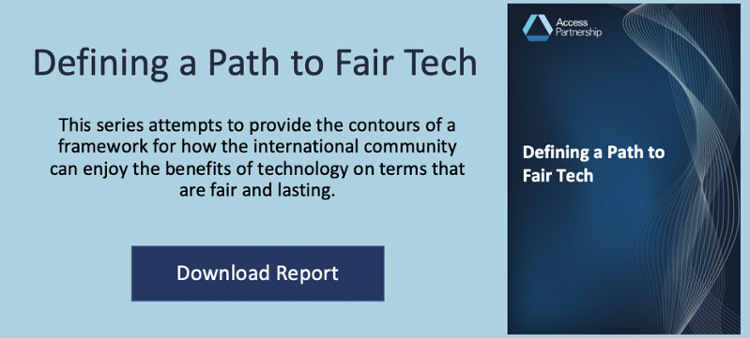Christopher Casarrubias
Head of Region, Latin America, Africa, and the Middle East
[email protected]
The emergence of new business models and services, increased efficiency and productivity across industries, improved living standards, direct job creation and contribution to GDP growth are some of the well-documented benefits of technology in the global economy. But for all these important contributions, across the southern hemisphere, there still exists a strong sentiment of suspicion and lack of trust in the technology ecosystem – its players (too big!), its bosses (too reckless!) , its services and business models (too intrusive!), its commitment to local communities (not enough, non-existent!).
African governments by and large believe that big technology companies are knocking out established businesses and local start-ups before they can establish themselves in their own patrias. Last year, a group of African countries led by Rwanda joined forces against e-commerce rules being discussed at the World Trade Organization (WTO) arguing that global digital leaders have decimated indigenous companies. Their overall feeling is that “Big Tech” has benefited from subsidies that the rich countries they come from can afford, while exploiting local labour and commodities in the developing world and causing environmental havoc.
In Latin America, there are also mixed feelings about what the role of technology players should be and how technology development and adoption can be fair – will artificial intelligence kill manufacturing jobs? Why 5G and when, considering 4G and even 3G are still being rolled out? In the face of all the challenges Latin America faces, what the heck would we want connected cars for? Even in the context of COVID-19, while some assumed a generalised period of regulatory forbearance and enforcement relaxation, the Mexican and Colombian governments are pressing forward with rules that would oblige video streaming platforms to carry locally originated content.
Elsewhere, as the technology and trade race between the United States and China heats up, developing economies are being forced to pick a side but not without significant trade-offs. For instance, close the doors to Chinese champions and financial aid from Beijing will stop flowing, or allow Chinese technology in your 5G network at the expense of risking historic trade partnerships and infuriating the strong capo in the White House.
In defence of the tech sector, we can certainly point out hundreds of examples across the globe where technology (and the targeted efforts of global technology companies) is making a difference in countries with emerging economies. This has taken many forms, including programmes and grants to support SMEs and community development, substantive investments on different technologies to connect remote communities or partnerships with governments to advance the digital transformation of public services. Without a doubt, technology companies have made big strides towards gaining a social license to operate in the global south. But that’s not the point, is it? It’s about perception, optics (ask policymakers if they know anything about the connectivity programs being rolled out by Big Tech), a legacy that while in the eyes of some has started to change, for many it is so deeply ingrained that it remains intact.
So, what then? What can the tech industry do to close the trust gap and be perceived as a responsible actor, a partner that is worth engaging and getting advice from?
First – the regulations! It is in the interest of the tech sector to promote sound and strong regulatory frameworks in developing countries. Regulations that support innovation and entrepreneurialism, but that at the same time protect citizens’ data and consumer rights, and the environment are needed. Not only because self-regulation is démodée (Big Tech companies themselves have been calling for governments to be more hands on regulating online activity) and its transparency and accountability shortcomings have been exposed, but because national regimes with clearly defined and consistent rules of engagement are good for business (especially when informality is so widespread, as is the case in the developing world). As such, tech companies operating in the global south should continue proactively having regulatory dialogues with government authorities even though the governance structure for holding those dialogues is often non-existent or flawed. Furthermore, tech should not dodge but take the bulls by the horns and respond to fundamental questions: what does rapid technology change mean for poverty and inequality? What will be the consequences of automation for local labour? How is citizens’ data being used and by whom? What steps are tech companies taking to ensure responsible sourcing and due diligence in their supply chains?
Second – the pipes! Broadband connectivity is the building block for digital transformation, without it access to services and applications for education, healthcare, financial and government services would not be feasible. While there has been important progress in expanding access to broadband, billions of people – a large proportion of which live in the developing world – still lack access to a reliable Internet connection. For many tech companies, improving this is a simple equation: more folks online = more folks in their platforms. For some it is also a mission and they are living up to it by investing in different types of infrastructure and supporting the development of regulatory frameworks that enable the use of new connectivity tools. However, there remain many tech businesses with big pockets and business models that fully depend on the Internet that do not contribute to its development, and this must change.
Third – EdTech! Lacking educational systems are one of the principal structural limitations that developing countries must address and although access to devices and digital educational content has spread around the world, the promise of technology in education has yet to be fulfilled. The tech sector should prioritise working with governments and other stakeholders in upgrading the educational capabilities of their teachers and students, particularly on STEM curricula. The use of cloud computing, data analytics, artificial intelligence, and even virtual and augmented reality can support this policy imperative and must do so with regards to privacy, safety and data security considerations.

